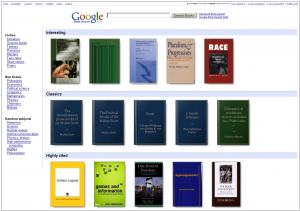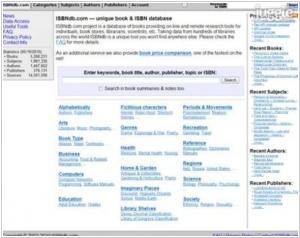Google Books vs ISBNdb.com
Last updated: July 09, 2023
Google Books and ISBNdb.com are two platforms that provide book-related information, but they have distinct differences in terms of their content sources, features, and user experiences.
1. Content Sources and Coverage: Google Books is a comprehensive platform that aims to provide access to a vast collection of books from various sources, including publishers, libraries, and authors. It offers a search engine for books, allowing users to find information about a wide range of titles. Google Books provides previews and snippets of book content, allowing users to get a glimpse of the book's content before making a purchase or accessing the full text. It also offers links to online retailers where users can purchase or borrow books. On the other hand, ISBNdb.com is a book database that focuses on providing information based on International Standard Book Numbers (ISBNs). It aggregates data from publishers, libraries, and other sources to offer details such as book titles, authors, cover images, and publication information. ISBNdb.com primarily serves as a reference tool for retrieving book metadata based on ISBNs.
2. Features and Tools: Google Books offers a range of features and tools to enhance the user experience. It provides advanced search capabilities, allowing users to search within books for specific keywords or phrases. Google Books also offers features like bookmarking, highlighting, and note-taking for personalized reading experiences. It integrates with Google's ecosystem, allowing users to access their book library across devices through the Google Play Books app. In contrast, ISBNdb.com focuses more on providing book data and reference information based on ISBNs. It offers search functionality based on ISBNs, author names, or book titles. ISBNdb.com provides APIs for developers to access book data programmatically, making it a valuable resource for applications and services that require book metadata.
3. User Interface and Accessibility: Google Books provides a user-friendly and visually appealing interface. Users can access Google Books through a web browser or the Google Play Books app, which is available on various platforms including web, Android, and iOS. Google Books allows users to read and access books online or download them for offline reading. ISBNdb.com, on the other hand, offers a straightforward and efficient user interface focused on retrieving book information based on ISBNs. It provides a clean and minimalistic design, prioritizing the display of book details and metadata. ISBNdb.com offers a responsive website that works well on different devices and screen sizes.
1. Content Sources and Coverage: Google Books is a comprehensive platform that aims to provide access to a vast collection of books from various sources, including publishers, libraries, and authors. It offers a search engine for books, allowing users to find information about a wide range of titles. Google Books provides previews and snippets of book content, allowing users to get a glimpse of the book's content before making a purchase or accessing the full text. It also offers links to online retailers where users can purchase or borrow books. On the other hand, ISBNdb.com is a book database that focuses on providing information based on International Standard Book Numbers (ISBNs). It aggregates data from publishers, libraries, and other sources to offer details such as book titles, authors, cover images, and publication information. ISBNdb.com primarily serves as a reference tool for retrieving book metadata based on ISBNs.
2. Features and Tools: Google Books offers a range of features and tools to enhance the user experience. It provides advanced search capabilities, allowing users to search within books for specific keywords or phrases. Google Books also offers features like bookmarking, highlighting, and note-taking for personalized reading experiences. It integrates with Google's ecosystem, allowing users to access their book library across devices through the Google Play Books app. In contrast, ISBNdb.com focuses more on providing book data and reference information based on ISBNs. It offers search functionality based on ISBNs, author names, or book titles. ISBNdb.com provides APIs for developers to access book data programmatically, making it a valuable resource for applications and services that require book metadata.
3. User Interface and Accessibility: Google Books provides a user-friendly and visually appealing interface. Users can access Google Books through a web browser or the Google Play Books app, which is available on various platforms including web, Android, and iOS. Google Books allows users to read and access books online or download them for offline reading. ISBNdb.com, on the other hand, offers a straightforward and efficient user interface focused on retrieving book information based on ISBNs. It provides a clean and minimalistic design, prioritizing the display of book details and metadata. ISBNdb.com offers a responsive website that works well on different devices and screen sizes.
62
Google Books is a service that searches the full text of books and magazines that Google has scanned, converted to text using optical character recognition, and stored in its digital database. Search and preview millions of books from libraries and publishers worldwide using Google Book Search. Discover a new favorite or unearth an old classic.
20
ISBNdb.com project is a database of books providing on-line and remote research tools for individuals, book stores, librarians, scientists, etc. Taking data from hundreds of libraries across the world ISBNdb is a unique tool you won't find anywhere else. Please check the FAQ for more details.
Google Books vs ISBNdb.com in our news:
2018. Google Launches Talk to Books
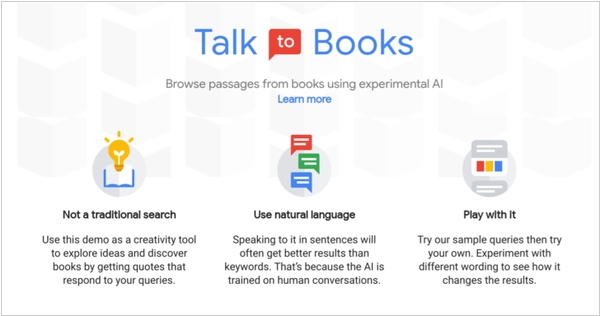
Google has recently introduced a groundbreaking service called Talk to Books, revolutionizing the way we delve into books by starting at the sentence level rather than focusing on authors or topics. With this innovative tool, you can make statements or pose questions, and it will locate sentences from books that directly address your query, without relying on traditional keyword matching. In essence, you engage in a conversation with the books themselves, receiving responses that aid in your decision-making process of whether to pursue further reading or not.
2016. Google Books will now make better suggestions on what to read next
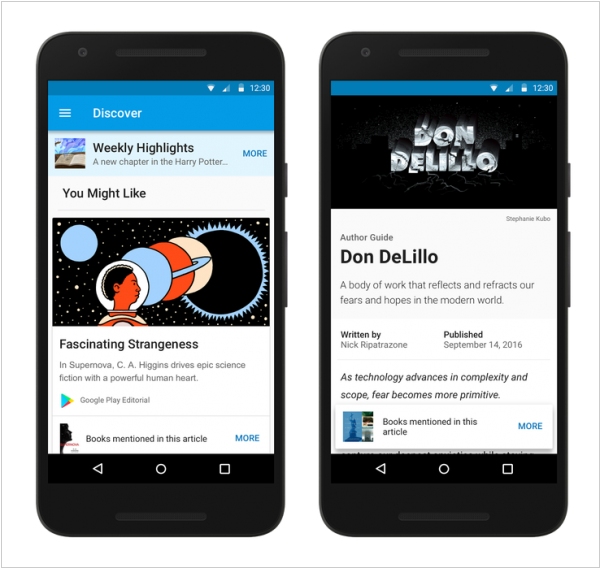
In an effort to compete with Amazon's Kindle app, Google Books has introduced an exciting feature known as "Discover." This feature is incorporated into the Google Books application and aims to assist users in discovering new reading material. It provides a dedicated section that offers personalized recommendations and popular suggestions from the wider community. By analyzing your reading habits on Google Books, Discover will present you with fresh and engaging stories that align with your interests. Additionally, it goes beyond your personal library and expands its recommendations to books mentioned in articles or videos you come across within the app, such as the newly introduced "Weekly Highlights" section. With these enhancements, Google Books strives to provide a comprehensive and dynamic platform for finding new and captivating content to read.
2015. Google Books project ruled legal by U.S. appeals court
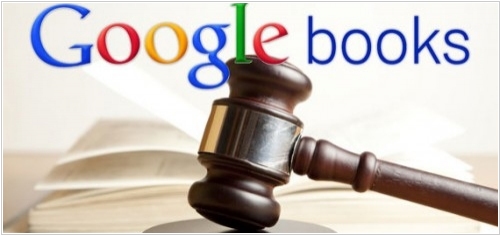
After a decade-long legal battle, a U.S. appeals court has signaled the nearing conclusion of the dispute by stating that Google's book scanning project, Google Books, does not infringe copyright law, according to Reuters. The decision follows a lawsuit filed in 2005 by the Authors Guild and some independent writers, who argued that the project would harm their earnings. In 2013, a lower court in New York ruled in favor of Google, stating that the project could actually increase author revenue by exposing potential customers to unfamiliar works. On Friday, the 2nd U.S. Circuit Court of Appeals in New York upheld the 2013 decision, determining that Google's publication of excerpts constituted Fair Use and served the public interest. For more information on downloading Google Books, refer to this article: How to download Google Books? ***
2013. Google Books survives the copyright fight

The lengthy legal dispute spanning eight years between the Authors Guild and Google Books has finally reached its conclusion. US Circuit Judge Denny Chin, based in New York, declared that the book scanning conducted by Google amounted to fair use. The judge justified this decision by considering the scanning process as "highly transformative" and determining that it did not negatively impact the market for the original works. Judge Chin further recognized the significant public benefits provided by Google Books, describing it as an indispensable research tool. He highlighted its role in enhancing accessibility for the visually impaired and preserving the content of aging books, which would otherwise succumb to physical deterioration. Dismissing the notion that Google's online book database deprived authors of income, the judge emphasized that Google does not sell the scans or make complete copies of books available. Instead, he concluded that Google Books facilitated readers in discovering new literary works, resulting in additional income for authors. The Authors Guild retains the option to appeal the ruling should they choose to do so. For more information, refer to the article on How to download Google Books?.

